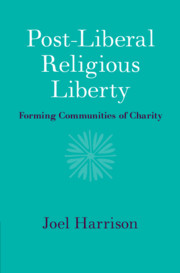Book contents
- Post-Liberal Religious Liberty
- Post-Liberal Religious Liberty
- Copyright page
- Dedication
- Epigraph
- Contents
- Acknowledgements
- Table of Cases
- 1 Introduction
- 2 The Liberal Egalitarian Account
- 3 Secularisation Challenged
- 4 Modern (Christian) Responses
- 5 The Ecclesiological Account
- 6 Pluralism and Disagreement
- 7 Conclusion
- Select Bibliography
- Index
5 - The Ecclesiological Account
Published online by Cambridge University Press: 06 July 2020
- Post-Liberal Religious Liberty
- Post-Liberal Religious Liberty
- Copyright page
- Dedication
- Epigraph
- Contents
- Acknowledgements
- Table of Cases
- 1 Introduction
- 2 The Liberal Egalitarian Account
- 3 Secularisation Challenged
- 4 Modern (Christian) Responses
- 5 The Ecclesiological Account
- 6 Pluralism and Disagreement
- 7 Conclusion
- Select Bibliography
- Index
Summary
Throughout this book, I have been building a contrast between two political imaginaries shaping different accounts of religious liberty. In the first, the modern imaginary leads to the liberal egalitarian account of religious liberty. It characterises politics as a space for negotiating and protecting claims of right, in which religion is now commonly associated with the individual’s capacity to develop his or her own conception of the good, convictions, or authenticity. Such a space is secular; that is, it is differentiated from religion in the end that it must serve. Indeed, it must be secular in order to stand as the neutral arbiter over and above any religious difference. In the previous chapter, I discussed three leading Christian scholars whose arguments tend towards accepting a secularised space of politics, for the sake of protecting pluralism (or the multiple and competing expressions of liberty) or an understanding of natural incommensurable goods. In both cases, politics is differentiated from religious ends. But I also suggested that the historical emphasis has been on a more theopolitical imaginary. Here, the Christian tradition has concerned itself with articulating and forming a community in which a plurality of groups could be understood as oriented towards shared ends under the encouraging and cooperative arms of spiritual and civic authority. I have referred to this end as ‘true religion’, and it is this that religious liberty serves.
- Type
- Chapter
- Information
- Post-Liberal Religious LibertyForming Communities of Charity, pp. 142 - 182Publisher: Cambridge University PressPrint publication year: 2020

